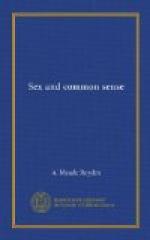Who that has once heard this can easily take anything less? Or who, having loved in any of these ways, will lightly break the bond? I think that one of the most profoundly moral relationships I have ever met between a man and a woman was, in spite of all that I have said up till now, the relationship of a man to a woman to whom at first he was not legally married. It was her wish, not his, but they were not legally married. They had no children, and she was unfaithful to him more than once, and yet this man—and he did not call himself a Christian—this man felt that he had taken the responsibility of that woman’s life, and though he could easily have put her away, and though, at last, she killed in him all that you would normally call love between a man and woman, and he learned to care for another woman, yet he would not abandon her because now she had grown to need him, and he felt he could not take so great a human responsibility as the life of another person and then cast it away as though it had never been. That is morality. To such a sense of what human relationships demand my whole soul gives homage. That seems to me a perfectly humane and, therefore, truly moral idea of what love involves. Such a sense of responsibility should go with all love. Passion cannot last, in the nature of things, and, therefore, those who marry do so, if they know anything at all of love—and, God help them, many of them do not—but if they know anything at all of love, they know that it is physically impossible for this particular bond always to unite them. They must be aware that there is something more than that, something that must in the end transcend that physical union.
Looking at marriage from that point of view, can one desire that it should be anything less than permanent, indissoluble? That which God made, and, therefore, which no man should put asunder? Let the community—both Church and State—teach this. Let us make it clear that men and women should not marry unless they do sincerely believe that their love for each other is of this character. Let them understand that physical union should be the expression of a spiritual union. Let them learn that love, though it includes passion, is more than passion, and must transcend and outlive passion. And let us insist that all should learn the truth about themselves—about their own bodies and about their own natures—so that they may understand what they do, and may have all the help that knowledge can give in doing it. I hold that on such knowledge and such understanding the community should insist, if it is to uphold the high and difficult standard of indissoluble monogamous marriage. So only can it be rightly upheld.
I urge also that when a marriage takes place the State has a right and a duty with regard to it. For the sake of every citizen, and most of all for the sake of the children, it should “solemnize” marriage, and should do so on the understanding—clearly expressed—that those who come to be married intend to be faithful to each other “as long as they both shall live.”




